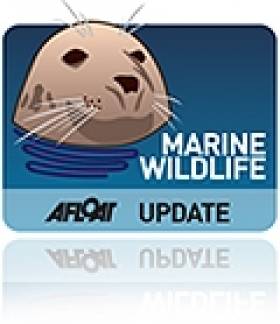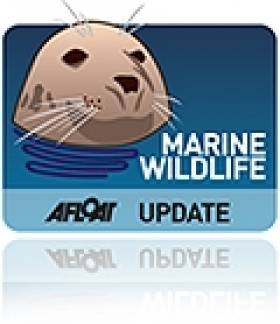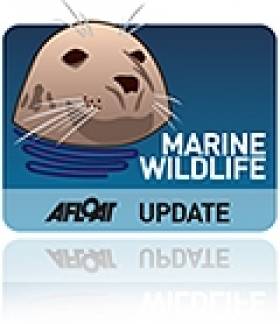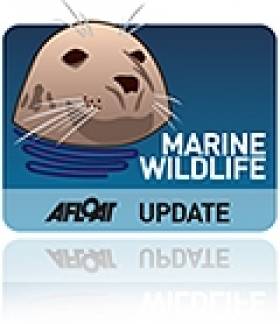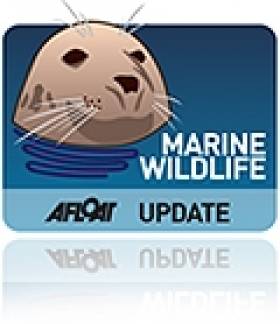Displaying items by tag: killer whales
Killer Whales, Minkes Spotted Off Coast
The Irish Whale and Dolphin Group (IWDG) has announced two new reports of whale spottings off the Irish coast in recent days.
On 14 October the east coast rescue helicopter spotted a group of at least five lunge-feeding whales just four miles off Dunany Point on the southern side of Dundalk Bay.
Their relatively small size, white banding on the pectoral fin and absense of any obvious blow confirmed them to be minkes - a marine wildlife record for the area.
"This is further proof, not that it is needed, that there is a growing list of places outside of the expected 'hotspots' where whale activity is now being documented," said the IWDG's Pádraig Whooley.
Yet more were spotted on the opposite coast the day after, when Nick Massett reported up to a dozen minke whales in a 1.5-mile box off Slea Head, near Dingle.
Meanwhile, this week a group of four killer whales was observed by the FV Celtic Cross on the prawn grounds off Co Louth, travelling in a north-westerly direction towards Dundalk Bay.
"There may well be something very interesting happening in this section of the Irish Sea that is attracting both baleen and toothed whale in the same area," said Whooley.
Time Running Out for Scotland's Resident Killer Whales
Time may be running out for Scotland's only resident pod of killer whales, the Scotsman reports.
The four males and five females have been studied at their home in the west of Scotland by the Hebridean Whale and Dolphin Trust and the Irish Whale and Dolphin Group for almost 20 years.
The marine mammals have been sighted at various times since 1981 by members of the public in Scotland, Wales and Ireland.
But since 1992 the group - known as the West Coast Community - has failed to produce a single surviving calf.
Marine biologist Dr Andy Foote said: "It's probably too late to save this group. I do believe that they will become extinct in our lifetime which is very regrettable since not many people even know that such a distinctive group of killer whales exist just off our coast."
Dr Foote believes possible contaminants in the waters off Scotland's west coast could be one reason why the pod is not successfully breeding.
The Scotsman has more on the story HERE.
More Whales Spotted in Irish Waters
Killer whales and a humpback whale have been spotted off the coast of Northern Ireland in recent weeks, according to the Irish Whale and Dolphin Group (IWDG).
Irish Weather Online quotes the IWDG's Pádraig Whooley, who said three killer whales - or orcas - had been seen off Rathlin Island in Co Antrim on 10 June. Two more were later spotted between the Down coast and the Isle of Man.
Then on 14 June a humpback whale was sighted off Bangor - only the third time the species has been seen in Northern Irish waters.
"Any sighting today of a humpback whale sends out a very strong conservation message," said Whooley.
Ireland Sees Largest Aggregation of Killer Whales
The Irish Whale and Dolphin Group (IWDG) has announced the largest aggregation of killer whales to date in Irish waters.
As many as a dozen killer whales, or orca, were spotted close to an Irish Naval Service vessel on patrol 30 miles off Tory Island in Co Donegal late last month.
According to Lt Cmdr Paddy Harkin of the LE Niamh, the killer whales were feeding among large shoals of mackerel that also attracted a large number of fishing vessels.
He added that the whales had apparently followed the mackerel from west of the Hebrides in north west Scotland, according to several fishing skippers - who placed their numbers at over 100.
The IWDG has more on the story (including photos) HERE.
Killer Whales Spotted off Kerry Coast
The Irish Whale and Dolphin Group (IWDG) spotted killer whales off the coast of county Kerry during an offshore survey last weekend. The killer whales crossed within two metres of the bow of the research vessel, others swam just beneath the surface keeping a parallel course with the surveyors.
The sighting of an adult pod is a rare encounter in Irish waters. 2010 has been a good year for killer whale sightings here with 14 validated records to date.
IWDG surveyors were able to photograph the whales and have sent the findings to expert researchers in the University of Aberdeen. It is understood these are new animals, not previously catalogued during the past few years of surveying killer whales in the North East Atlantic.
More on the sightings HERE.



























